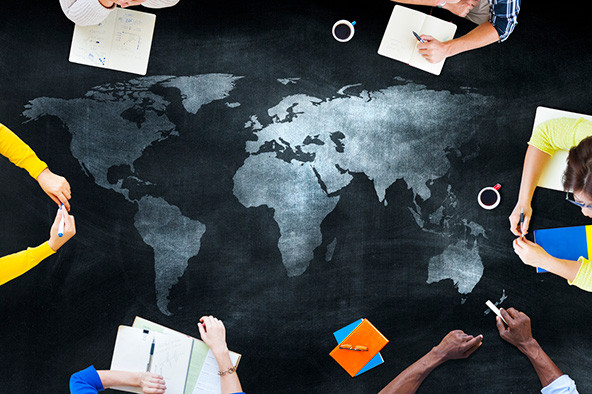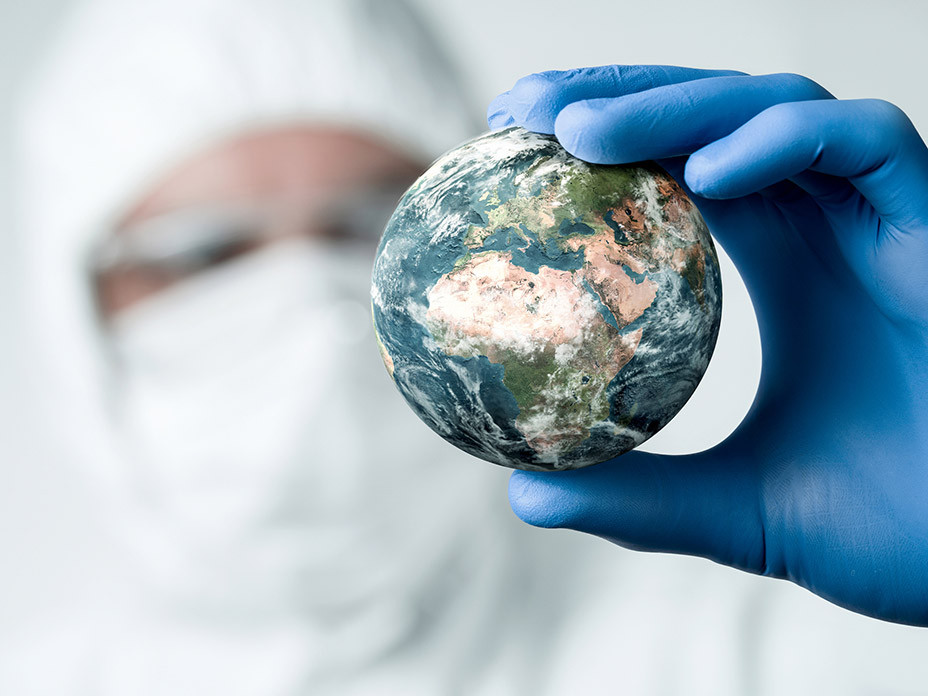 (Photo by iStock/Rawpixel)
(Photo by iStock/Rawpixel)
At the global learning team at the Robert Wood Johnson Foundation, it has been exciting to see people looking at what the world can teach us, whether that be how China is handling COVID-19, South Korea’s drive-through testing, or New Zealand’s elimination of the virus under Jacinda Ardern’s leadership. Yet in a survey conducted by Candid in early 2020 of foundations located in the US, 73 percent of respondents reported that their domestic grantmaking was rarely or not at all informed or inspired by ideas and solutions from around the globe and beyond US borders.
These practices may be shifting. Those of us working in philanthropy, government, and social change are trying to learn as much about COVID-19 as possible, and that naturally includes looking abroad. Yet what will we actually see when we do? Too often, our vision is obscured by bias, and as we try to distinguish news from noise, good intentions are often not enough. We must ask ourselves critical questions, and train ourselves to overcome our biases.

Here are four ways to see the world in a new light, as we look to come out of the pandemic’s darkness:
Seeing Beyond the Familiar
COVID-19 has no borders and the same with good ideas. But too often, we are limited by what has been called the “country of origin effect,” a psychological effect in which people understand the quality and relevance of an object or idea by the country it comes from. In short, we tend to look for ideas from countries that are demographically, culturally, economically, or politically similar to us. In the US, this can mean we overvalue learning from Europe and undervalue learning from low- and middle-income countries.
Yet countries like Nigeria have much to teach us about contract tracing and mitigation from their experience eradicating the Ebola outbreak, just as Ghana’s innovative testing and taxation policies (including a three month tax holiday for health care workers) are balancing protecting health and the economy. In example after example of necessity being the mother of invention, African nations are leading the way in innovation: developing low-cost tests for under $1, using zipline drones to transport the tests to testing sites, and leveraging its cashless digital payment infrastructure to facilitate social distancing. Another often-ignored source of inspiration are Indigenous cultural practices, where ideas and practices centered around collective well-being can be instructive for us as we tackle issues of inequity arising out of COVID.
Seeing With Others
Another approach to global learning begins by acknowledging our own lack of understanding so that we can see through others’ eyes. And when we go exploring—either in person or virtually—it’s always good to invite others to come along, because they will see things differently, picking and choosing the learning that will most benefit their communities. Such a learning journey can begin by asking others what needs they have or what questions they are exploring, inviting them to join in phone conversations with people from different countries, and be reflected in each stage of your learning journey from the questions you ask to the connections you make.
For example, just as leaders from Pittsburgh and Glasgow learned from each other about post-industrial recovery—with our support—we were already planning a study tour to Bhutan, prior to COVID-19, to see what leaders in the US could learn from their approach to well-being. We hope, whatever form it eventually takes, that this trip will show how their culture of happiness and communal thinking has contributed to positive outcomes in the pandemic, as private hoteliers have offered free housing while farmers and farming co-ops have provided food free of charge. We are excited to see what US community leaders will learn from experiencing what Bhutan is doing first hand.
Seeing with others can also begin closer to home: When leaders in Massachusetts were struggling with how to handle contact tracing, they connected to the Boston-based Partners in Health, who could leverage their 30 years of experience in fighting other pandemics around the world. Most of all, seeing with others means eschewing top-down authoritarian approaches. In Taiwan, for example, Digital Minister Audrey Tang credits their national success in stopping the spread of COVID to their willingness to trust the people themselves, relying on “the collective intelligence of a vibrant society." One tactic involved fighting “rumor with humor,” encouraging citizens to ridicule conspiracy theories and help ensure that science spread faster than fiction.
Seeing Different Underlying Conditions
While we still need to learn as much as we can about how the virus spreads and how to stop it, the disparities between the successes and failures of different countries run much deeper than the epidemiological, medical, or technological facts. To mitigate the effects of the virus on society, we must better understand the broader range of underlying conditions that can exacerbate the pain and contribute to healing.
For example, the pandemic underscores how much where we live, learn, and work impacts our health. Countries like Germany and England are directly addressing these connections by guaranteeing incomes while countries like Afghanistan are waiving rent. But we are also connecting how different leadership styles contribute to outcomes: From Finland to Taiwan, it seems that women leaders practiced humility in seeking out learning from more diverse groups, were more risk-averse in decisions that affected health, and more caring in how they communicated to their constituents.
One underlying condition that the pandemic has exacerbated is domestic violence. When people shelter in place, those in abusive homes tend to be subject to more abuse, often unable to find outside help or to even make a phone call. Some European countries are addressing this need, including Italy who adapted an app originally designed to address bullying, to meet this surging need: YouPol allows people to contact police without making a phone call. Meanwhile, in Brazil, favelas that were already distressed by lack of access to basic resources have called on their history of self-sufficiency and resilience to form “crisis cabinets” to access and pool important resources and share information necessary to combat the spread and address the underlying conditions that contribute to its disproportionate effect. These locally-organized units have not only helped to inform broader national policy for this crisis, but potentially for future ones as well.
Seeing With New Eyes
Sometimes the real journey is not seeking new landscapes but seeing the world with new eyes. On my team at the Robert Wood Johnson Foundation, we call this “Blue Marble Thinking,” inspired by how the first sight of the now-commonplace image of the earth from space, “the blue marble,” profoundly changed how we think of our planet.
So how can we see things with new eyes today?
In March, Portugal made the decision to grant all refugees and migrants temporary residence status, to allow them access to the same healthcare and social services as Portuguese citizens. If they had been seen as different from citizens, in status, ethnicity, and rights, they are now recognized as having equal rights to access care and pursue good health.
All around the world, there are things that will “look differently” than they did before the pandemic, from what is deemed an essential worker to our relationship to our planet. In Milan, for example, the coronavirus lockdown has inspired leaders to see transportation and the true purpose of their streets differently. In the process, they have addressed issues of pollution and mobility, a transformation they hope will have a long-lasting impact on the quality of living. Or take Liberia, where officials looked at unemployed workers and saw an opportunity, to retrain them as community health workers, freeing two birds with one key (an approach also called “multi-solving”). And in Hungary, two groups disproportionately impacted by social isolation have been the elderly and young people, but rather than seeing two populations in trouble, non-profit organizations designed a program for them to help one another. The program, called “How are you today?” connects young people who had previously volunteered at music festivals to talk four or five hours a week with senior citizens, providing much-needed connections during these especially trying times.
Conclusion
In a provocative new report, Geoff Mulgan suggests that because we collectively suffer from a lack of public and social imagination, we need to look to countries who “have created cultures that over long periods of time enabled them to imagine and pioneer new ways of social organization.” Using New Zealand as an example, he points to their status as being “the first country with universal suffrage (including women) in the 1890s, the first modern welfare state in the 1930s and now things like the first wellbeing budgets today.”
On our global learning team, we ask on every project how our work changes how we think and what we do in the US. In other words, we look to other countries with the hope that doing so will change how we see our own, opening our imaginations to new ideas, solutions, and futures. This is only possible if we can overcome our biases that impair our ability to see the solutions around us.
COVID-19 will be studied for generations to come. But what the world will learn will depend on what we were able to see today. Did we seek out solutions from every corner of the world? Did we bring on the journey those who would most benefit from what the world had to offer? Did we recognize the underlying conditions that exacerbate inequity or help overcome it? Was our imagination strong enough to see how we can create the kind of society that allows everyone the opportunity to live healthy and happier lives?
Support SSIR’s coverage of cross-sector solutions to global challenges.
Help us further the reach of innovative ideas. Donate today.
Read more stories by Karabi Acharya.

